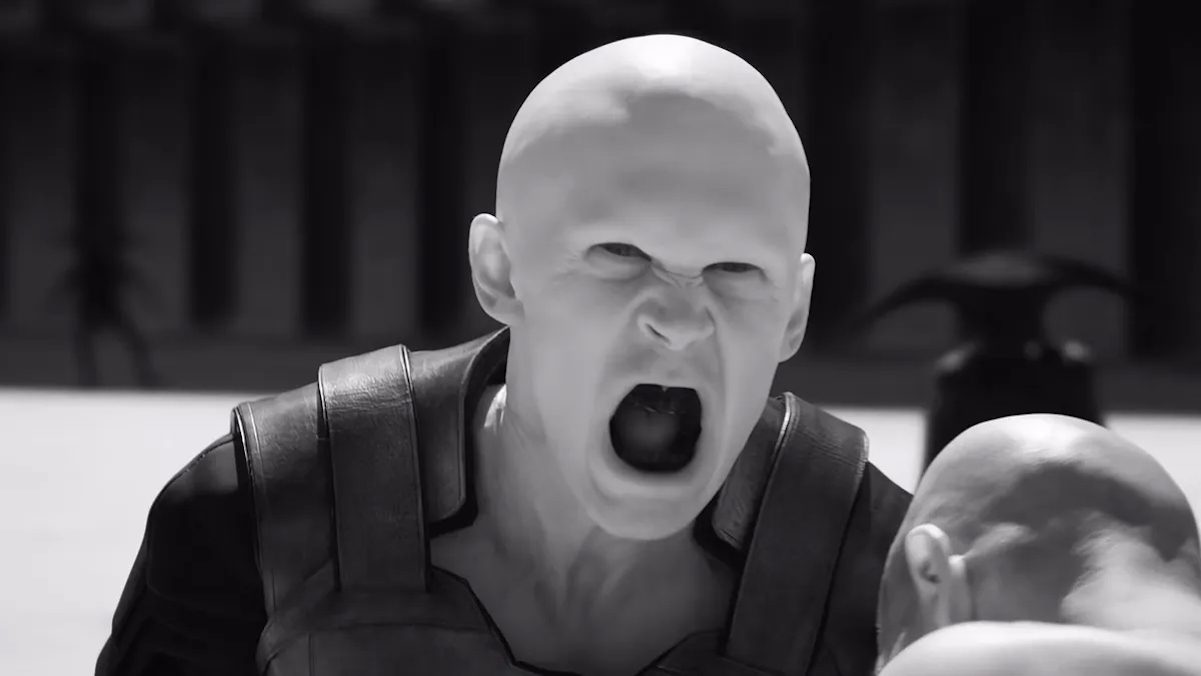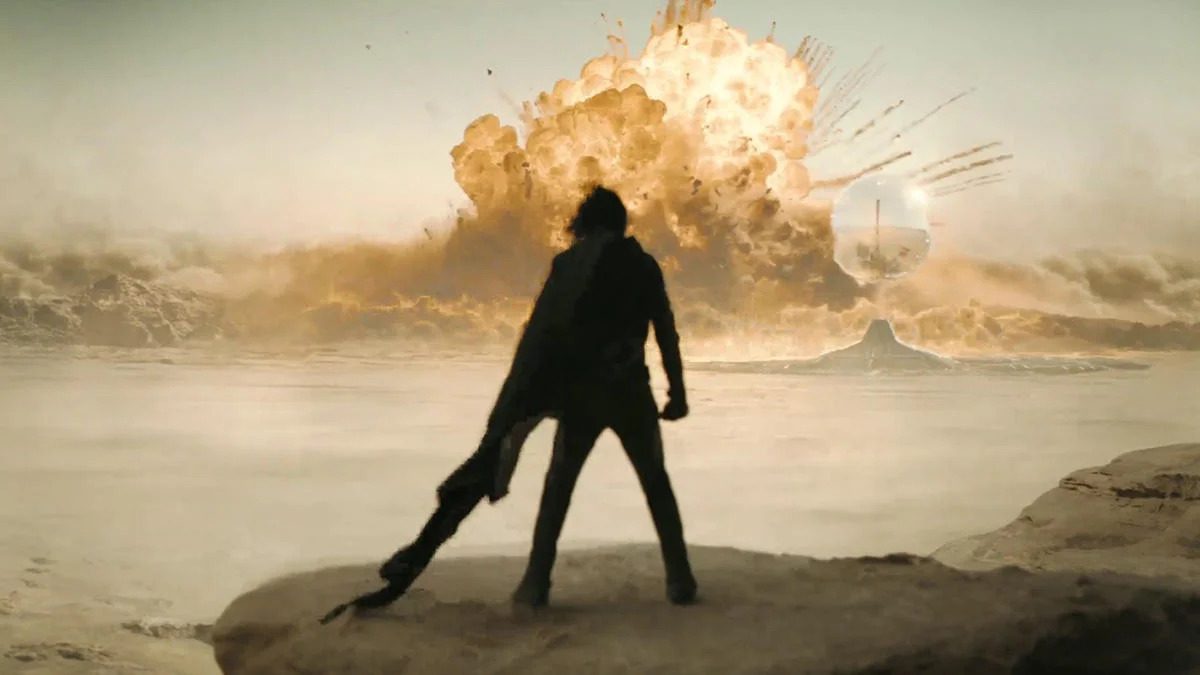REVIEW: Dune: Part Two (2024)
Dune: Part Two hits theaters less than three years after Dune: Part One, but it feels like we’ve been waiting for this film forever. Part of that is, undoubtedly, its postponed release date, but it’s also because Dune: Part One felt like it was the first two acts of an incomplete story. But that’s the rub when you’re adapting one book into multiple movies: you’re going to have unfinished business till the second half arrives. Is Dune: Part Two a satisfying culmination of cinema’s latest sci-fi epic? Mostly, yes, it is.
Having lost his father and witnessed the destruction of his people, Paul Atreides (Timothée Chalamet) plots revenge on the conspirators responsible as he learns desert combat and survival from the Fremen, the native inhabitants of Arrakas. Complicating matters is the belief among certain Fredmen sects that Paul is the Muad’Dib, a messianic figure that will lead them to paradise. Meanwhile, Baron Harkonnen (Stellan Skarsgård) sends his henchmen to destroy the Fredmen and gain control of the spice, and the Bene Gesserit plot to manipulate the situation to their own ends.
Like the previous chapter, Dune: Part Two is interested in exploring grand themes, this time with a religious bent. It tackles the notions of religion, prophecy, and anointing someone a messiah or prophet. The Fremen’s belief that Paul is the Muad’Dib is examined from several perspectives: those who believe in him devoutly, those who dismiss the notion as a dangerous superstition, and those who think Paul should use the power of belief to his advantage. And Paul is in the middle, faced with the dangers of having people who will follow him into hell. If he acts as the Fremen’s messiah, he could get a lot of people killed; if he doesn’t, he could shatter the faith of new friends who risked everything for him. He could also be passing up his one chance to avenge his father and stop a brewing war between the various Houses that make up whatever this empire is. (It’s still kind of vaguely defined.) Timothée Chalamet is very good in the role, conveying Paul’s conflict with the situation and his growing comfortableness with being a religious figure.
At the center of this is Chani (Zendaya), the woman Paul had been dreaming about in Dune: Part One. Chani is not a Muad’Dib true believer, and she initially resents Paul as an outsider forcing his way into her culture. Her views on the prophesied one are those of the realist; she sees it as a way for the empire to control the Fremen, to make them complacent as they await their mystical champion, and Paul’s presence feeds into that. Her arc is one of the best aspects of Dune: Part Two, as she slowly changes her impressions of Paul, if not her lack of belief, and their growing romance gets them to challenge their impressions of the prophecy, even if they’re more similar at the outset than Chani acknowledges, and Zendaya plays this well. The questions about the many perspectives on Paul’s possible destiny are fascinating. Is there such a thing as a messiah, or is it the fantasy of desperate people who’ve been stoned on hallucinogens their whole lives? Is it better to indulge a belief or be realistic, no matter what it does to the believer? And at what point are you just manipulating good people clinging to hope in a hopeless situation?

What makes this thematic throughline even more compelling is how it’s mirrored by the villains. The Harkonnens, the Emperor, and the Bene Gesserit are not believers in the Fremen’s chosen one; it’s even suggested that they created the prophecy to control the Fremens. But while they consider themselves more practical and thoughtful than the Fremen (even the Bene Gesserit, who believe in their own mysticism and prophecies), their secular machinations revolve around putting their trust in someone. The difference is that they want to control him, while the Fremen want to be controlled, and they prop up Feyd-Rautha (Austin Butler), Baron Harkonnen’s psychotic nephew, as their champion. Is this any less crazy than the Fremen putting their trust in some skinny kid who has to be taught how to walk on sand? It’s hard to say, and watching the two factions rationalize their faith in these two opposing figures is illuminating about human nature and the folly of thinking you’re smarter than – or all that different from – those you consider yourself above.
As a narrative, Dune: Part Two hits the ground running in a way Part One couldn’t. This is both an advantage and a drawback. On the one hand, the set-up is largely out of the way, so the film can just dive in and get to the story; there’s no need for world-building and introductions to various aspects of Arrakas. However, that was some of the best stuff in Part One, and the awe of discovery is forfeited in favor of a faster pace. And that’s something surprising about Dune: Part Two; while it’s a thoughtful, deliberately paced movie, it feels faster than it probably is, never getting boring despite a lot of talking and traversing the desert. (To be fair, this probably depends on your tolerance for hearing the characters discuss some of these ideas at length; I don’t think these movies are for everyone.) There are so many characters with different views who move the plot along in different ways that Dune: Part Two doesn’t drag.

That being said, Dune: Part Two didn’t wow me as much as I thought it would. There are some fantastic shots and good action scenes – this is a Denis Villeneuve movie – but there’s nothing as spectacular as that big battle scene in the middle of Dune: Part One, with its beautiful nighttime explosions and jarring (in a good way) shifts in light and dark. Much of the climax of Dune: Part Two feels rushed and truncated, like a lot of footage may have been cut, and as much as I like the film, it’s a bit of a letdown after so much build-up. I also would have liked more time spent with the villains. While Feyd-Rautha’s ruthlessness and insanity are established quite well (and Austin Butler is fantastic, intimidating and unnerving as a violent, unpredictable lunatic), I’d have liked them to explore other facets of his character that are only hinted at in the movie. And the Emperor is more a plot point than a character, with Christopher Waken wasted but for his presence, and even that is only in a couple of scenes. The same is true of his daughter, played by Florence Pugh, who never gets much of a chance to show what a good actress she is. Even the Bene Gesserit feel like they’re being scooted away just when their schemes are getting interesting. I wonder if there’s a longer cut of Dune: Part Two waiting in the wings.
But what’s here is very good, and while I think Part One holds together better, I like Dune: Part Two very much. It’s an interesting place to take Paul Atreides’ story, and it explores its themes fully, unlike a lot of modern movies that introduce big ideas only to drop them. It needed a little more on several fronts, but it’s an entertaining, thought-provoking sci-fi film nonetheless.
Dune: Part Two (2024)
Plot - 8
Acting - 9
Directing/Editing - 9
Music/Sound - 8
Themes - 10
8.8
Great
Dune: Part Two is a thoughtful exploration of religion and faith, and though it could have spent more time with some characters and delivered some more visual splendor in places, it’s an excellent sci-fi movie worth seeing in theaters.
Comments (2)

Agreed, it shows that spectacle can still be smart, that you don’t have to choose between being thoughtful and entertaining, something we used to see more of. And I love that they avoid the noble savage trope with the Fremen, which is very rare nowadays; when Paul’s mother asks what would happen if she turned down their offer, Bardem straight-up tells her they’d kill her and use her body water. They’re not some perfect bunch of paragons. It’s awesome writing.








Was a very epic movie. Felt like an event being there and watching it. To me, it was a spectacle and I did not enjoy Part 1 that much. Director likes to slow down often and I think that is important. A shame he insists on movies because, as a series, I do wonder if Dune could have been the next Game of Thrones? Someone talked about how they used the worms like dragons in that show, riding them into battle. The shots were really good in this movie and reminded me of Graphic Novels I like, such as Alix Senator or The Rise and Fall of the Trigan Empire. I like things with masses of tribal people like that. I like the use of The Voice and the soft, invisible hand power of the Bene Gesserit. Also, how the Emperor called Duke Leto a weak man because he followed the rules of the heart and tried to rule by heart. You could see the dedication and professionalism that went into this though. Lots of effort was made to attempt greatness. You gotta respect that.